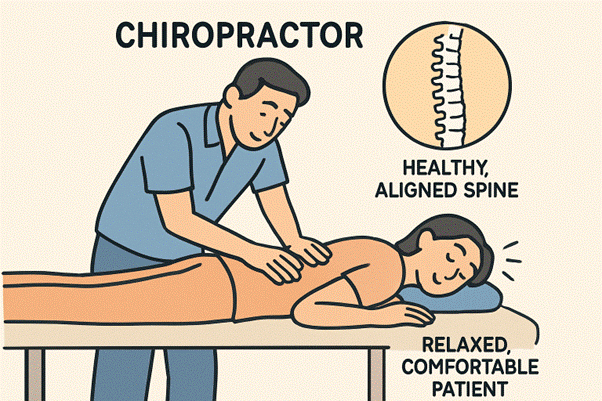Chiropractic care provides a natural, noninvasive approach to managing pain by targeting the root causes rather than the symptoms. Spinal adjustment and overall technology help improve alignment, mobility and overall body function. Many individuals reduced discomfort, increased flexibility and experienced a better quality of life. Beyond the relief from pain, the curiosity methods promote long-term welfare by supporting the natural healing processes of the body, making it a valuable option for those looking for the option of drugs or surgery.
Wht is carpactic pain management?
Chiropractic pain management is an integrated, patient-centered approach that addresses musculoskeletal issues by emphasizing overall treatment. Instead of just targeting the symptoms, the chiropractic care attempts to cure the underlying imbalance that contributes to limiting discomfort and function. This creates a preferred, non-optional option for many people seeking permanent relief—the need for relief for long or specific life stages. From adults to seniors and even children, through special pediatric care, services are designed to meet individual needs and ages.
Chiropractors support natural remedies and better quality of life by focusing on relationships between the spine, nervous system and overall body function. People often move to pain relief, increased dynamics, better posture and chiropractic care for overall well-being. The philosophy centers on allowing the body to fix itself when provided with optimal alignment and nerve communication.
How Calcopactic Technology works
various methods to reduce pain and promote recovery. The most common technology is spinal adjustment, also known as spinal manipulation. This hands-on method includes quick, controlled movements to recover spinal vertebrae, which can remove pressure on the nerves and restore joint mobility. Physicians can also use soft tissue remedies such as massage, stretching, and myofascial release to break adhesions, reduce muscle stress and improve circulation. Additionally, treatment schemes often include resource-assessed adjustments, therapeutic exercises and ergonomic counseling.
Scientific evidence behind these techniques is increasing that proper spinal alignment can reduce pain by reducing localized inflammation, increasing nerve function and improving biomechanics. Through these mechanisms, the chiropractic technique can address immediate discomfort and contribute to older issues in the root causes.
General circumstances treated by a chiropractor
Chiropractors are usually sought for conditions such as back pain, neck pain, stress headache, migraine, sciatica and sports-related injuries. Studies have also shown chiropractic care to be effective in managing whiplash, repetitive stress injuries and chronic low back discomfort. According to the National Center for Complementary and Integrative Health, every year millions of Americans benefit from chiropractic services for the following reasons: a strong safety profile and high satisfaction.
Research-supported benefits of chiropractic care
Many research studies support the efficacy of chiropractic care for pain management and increased dynamics. A systematic review published in JAMA provided significant support to spinal manipulative therapy in reducing moderate but significant back pain. In addition, CDC’s data on pain management briefly suggests that non-pharmacological therapies such as chiropractic are recommended as the first-line pain treatment due to their safety and effectiveness.
Beyond the relief from pain, patients often report improvement in daily work, return to activity after injuries, and decrease in dependence on drugs that may risk side effects.
Comparison of chiropractic to other pain management options
Unlike the drug, which temporarily suppresses symptoms, chiropractic care addresses the physical root of many musculoskeletal conditions, making it a long-term solution. Although sometimes necessary, surgery is borne by risk, high cost and extended recovery time. Physical therapy and chiropractic care often complement each other, as both focus on restoring movement and function, yet chiropractic emphasizes spinal alignment and nervous health as fundamental.
Chiropractic may be better for people looking to avoid pharmaceuticals, frequent injections, or aggressive processes. However, a collaborative approach that contains medical and rehabilitation professionals can provide the best results for severe or complex conditions.
What is expected during safety and a trip
Chiropractic care is generally safe when performed by a licensed businessman. A specific new patient travel begins with a comprehensive health history and physical examination, which often involves currency and mobility assessment, followed by recommendations of analogous care. Spinal adjustment, when suitable, is done with precision and care, and most patients experience minimal side effects, usually limited to mild agony.
When selecting a provider, it is advisable to check the credentials, inquire about the experience with your special symptoms, and ask about the techniques used. Common any medical condition or previous injuries, and do not hesitate to ask questions about your care plan.
Integration Chiropractic care works best when combined with healthy lifestyle practices.
Regular exercise, core strengthening, work and proper ergonomics at home, and a nutritious diet can all increase spinal health and systemic well-being. Many chiropractors provide guidance on these aspects and recommend stretches, posture improvement, or dietary tweaks to support your progress. Reduction in effective stress—through mindfulness, deep breathing, or attention—may also promote your body’s ability to fix future injuries and resist.
Frequently asked questions about Cairopractic Pain Management
What insurance coverage takes care of coverage?
Many health insurance schemes cover chiropractic services, especially acute pain or treatment of injury. Check with your provider for specific details.
How many sessions will I need?
The number of required sessions varies depending on diagnosis, severity and personal health goals. Some conditions are solved in some trips, while older issues may benefit from ongoing care and maintenance.
Does chiropractic care hurt?
Most adjustments are not painful. Patients may experience a feeling of relief or, sometimes, a start to a new exercise routine.
What are the long-term benefits?
After integrating chiropractic care into their routine, many people experience increased constant pain relief, better mobility, better posture and overall well-being.
Conclusion
Chiropractic pain management provides a composite, research-supported path to individuals seeking noninvasive, practical solutions to musculoskeletal issues. By targeting the source of inconvenience and empowering patients through education and lifestyle partnerships, chiropractic may be a valuable addition to your health care journey. If you are considering alternatives to medicines or aggressive remedies, care can provide you the necessary relief—while supporting your body’s natural ability to fix and flourish.







